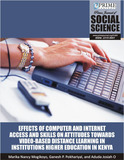Effects of computer and internet access and skills on attitudes towards video-based distance learning in institutions higher education in Kenya

View/
Date
2014Author
Marika, Nancy M
Pokhariyal, Ganesh P
Aduda, Josiah O
Language
enMetadata
Show full item recordAbstract
This paper explores the possibility of using Videoteleconferencing (VTC) Technology to enhance distance learning mode of education for Institutions of Higher Learning in Kenya. It looks at the readiness with regard to the level of Infrastructure development in terms of availability of computers and the Internet. The competence of resource persons and students in use of computers and the Internet are also explored in this study. The study further tests the effects of Computer and Internet access on the attitude towards use of Videoteleconferencing or Video-based distance learning. Videoteleconferencing or Videoconferencing is a form of E-learning that falls in the category of Synchronous learning that involves distance learning students having a live instructor teaching via the Internet (Obringer, 2001). Implementation of Videoconferencing in Institutions of Higher Learning in Kenya would facilitate access of higher education to all Kenyans in the various towns as well as make Institutions of Higher Learning to sustain themselves due to additional revenue generated. The services of experts working in industry could be made available to the various Institutions thus saving on overhead expenses like office space, healthcare, pension plan, sabbaticals, secretarial help and infrastructure while at the same time the experts will disseminate a wealth of knowledge and experience to students. This research was a case study of the University of Nairobi, School of Business and School of Education. The findings indicated that 74.2% of the respondents had a positive attitude towards Videoconferencing. This implies that Videoconferencing is a form of learning that can be accepted by staff and students.
URI
http://www.primejournal.org/PJSS/pdf/2014/nov/Mogikoyo%20et%20al.pdfhttp://hdl.handle.net/11295/80554
Citation
Mogikoyo MN, Pokhariyal GP, O AJ. "Effects of computer and internet access and skills on attitudes towards video-based distance learning in institutions higher education in Kenya." Prime Journal of Social Sciences. 2014;3(11):926-931.Publisher
University of Nairobi
